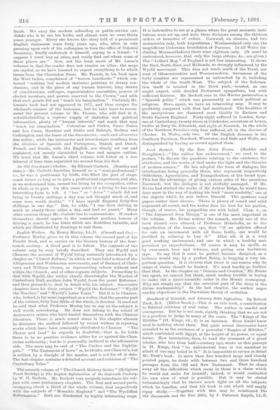English Writers. By Henry Morley, LL.D. (Cassell and Co.)— Professor
Morley gives us in this volume the second part of his Fourth Book, and so carries on the literary history of the four- teenth century. A third part is to follow. The contents of the volume may be very briefly described. They are Wyclif and Chaucer, the account of Wyclif being naturally introduced by a chapter on " Church Reform," in which we have brief notices of the Albigensian and Waldensian movements, and of Bernard of Clair- vaux and William Occam, as representing reform without and within the Church ; and of other cognate subjects. Proceeding to deal with Wyclif, the writer clearly disentangles the Warden of Canterbury Hall, another John Wyclif, from the great Reformer, and then proceeds to deal in detail with his subject. Successive chapters have for their subject " Wyclif the Reformer," " Wyclif the Teacher," and " Wyclif's Later Years." But it is to Chaucer, who, indeed, is far more important as a writer, that the greater part of the volume, fully four.fifths of the whole, is devoted. It need not be said that what Professor Morley has to say on the subject is well worth considering. He does not belong to the school of destructive 'critics who have busied themselves with the Chaucer literature. There is much sound sense in the chapter wherein he discusses the method followed by recent writers in rejecting works which have been commonly attributed to Chaucer. "The Flower and Leaf" he regards as doubtful,—that is, he holds there to be no positive evidence either for or against the Chau• cerian authorship ; but he is personally inclined to the affirmative side. The same may be said of "The Cuckoo and the Nightin- gale." " The Testament of Love" is, ho thinks, not Chaucer's, but is written by a disciple of the master, and is not far off in date. The last chapter contains a detailed account and criticism of " The Canterbury Tales."










































 Previous page
Previous page